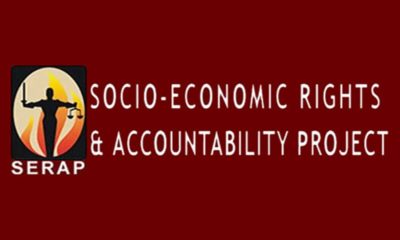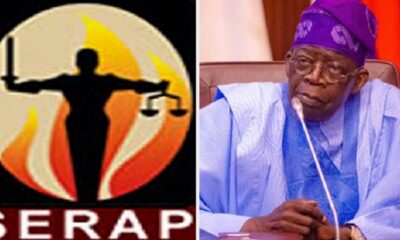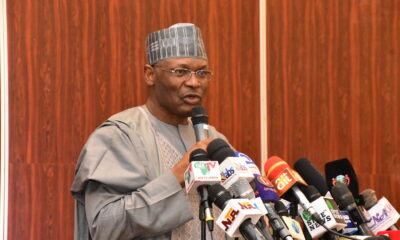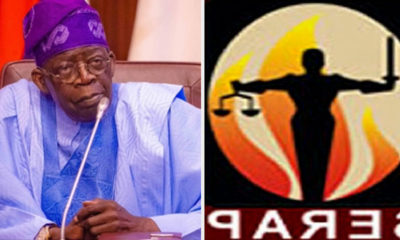NEWS
₦121.67trn Debt: SERAP Alleges World Bank Is Culpable
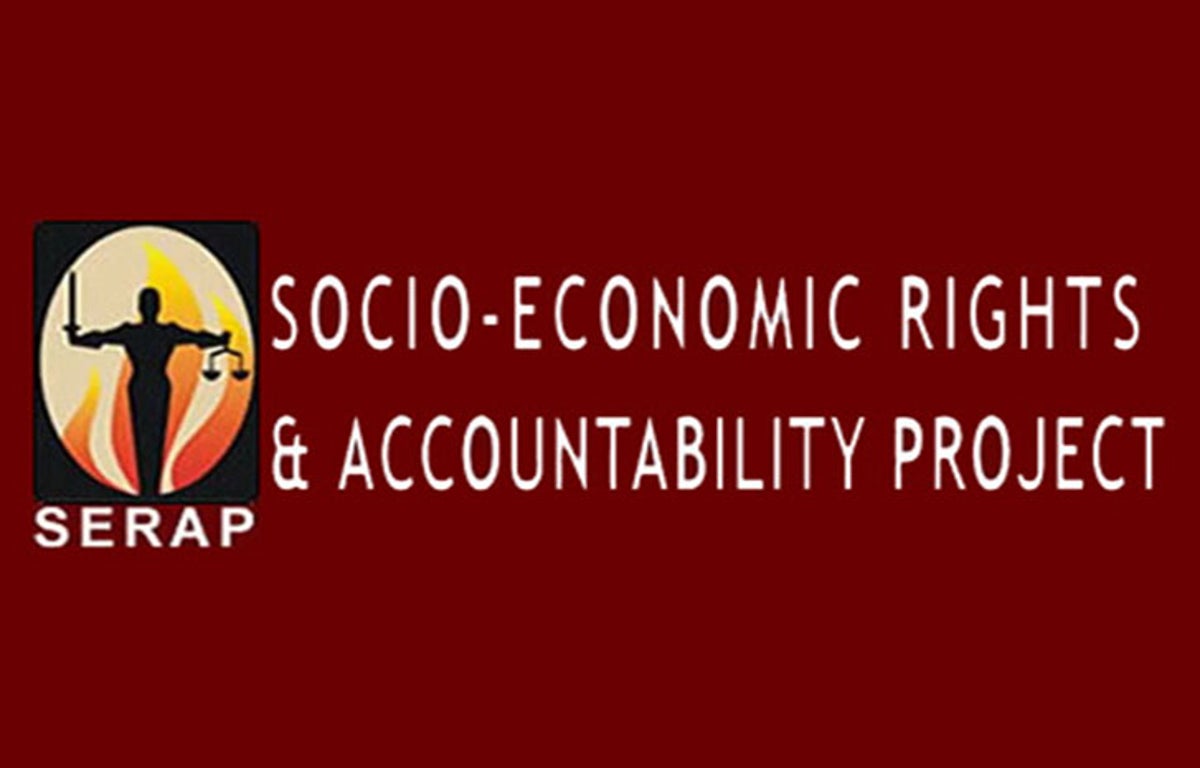
The Socio-Economic Rights and Accountability Project (SERAP) is of the view that the World Bank is culpable for the staggering $91.46 billion of public debts weighing Nigeria down, in addition to its misappropriation.
To this end, the SERAP has sent a complaint to the World Bank Inspection Panel demanding a thorough probe of the “allegations of corruption in the spending of the loans and other funding facilities obtained by the Federal Government and Nigeria’s 36 state governors and to review the implementation of all Bank-funded projects by successive governments since 1999.”
The SERAP urged the Inspection Panel “to determine the extent to which Bank Management has followed or is following the World Bank’ s operational policies and procedures applicable to the design, appraisal and implementation of all Bank-financed projects in Nigeria.”
The SERAP also urged the Panel “to determine the effect of any failure by the Bank Management to effectively implement its operational policies and procedures in all Bank-funded projects in several states on the social and economic rights and well-being of millions of socially and economically vulnerable Nigerians.”
The SERAP’s complaint followed the Debt Management Office (DMO)’s report last week, that Nigeria’s total public debt stock, including external and domestic debts, increased by ₦24.33 trillion in three months alone, from ₦97.34 trillion ($108.23 billion) in December 2023 to ₦121.67 trillion ($91.46 billion) as of March 31, 2024.
The SERAP’s averments were detailed in a letter dated 22 June 2024 and signed by SERAP deputy director Kolawole Oluwadare.
It stated, “The World Bank has over the years reportedly approved 197 projects for Nigeria, totalling over $36 billion in loans and other funding facilities [that is, $36,360,415,968.81], with little or no impact on Nigerians living in poverty.”
The SERAP said, “Nigerians are rarely informed and meaningfully and effectively consulted about several of these loans, facilities and Bank-funded projects. Nigerians continue to be denied the benefits of the loans and facilities and access to basic public goods and services.”
According to the SERAP, “Despite several loans and other funding facilities provided by the World Bank over many years, millions of socially and economically vulnerable Nigerians in several states and communities continue to lack access to regular electricity supply and have denied the benefit of renewable energy solutions.”
The complaint, addressed to the Chair of the Panel, read in part, “A recent report by the National Bureau of Statistics (NBS) revealed that over 133 million Nigerians are living in poverty, the majority of them women and children. We would therefore be grateful if the recommended measures are taken to hold the World Bank to account.
“The apparent failure by Bank Management to diligently follow the World Bank’s operational policies and procedures in Bank-funded projects have resulted in the alleged mismanagement of the loans and facilities and exposed millions of Nigerians to extreme poverty.
“We are concerned about the negative impact of the lack of transparency and accountability in the spending of loans and facilities obtained by the Federal Government and Nigeria’s 36 state governors on the social and economic well-being of millions of Nigerians and the enjoyment of their human rights.
“We are concerned that several Nigeria’s 36 states and the FCT reportedly owe civil servants’ salaries and pensions. Several states are borrowing to pay salaries. Millions of Nigerians resident in these states and the FCT continue to be denied access to basic public goods and services.
“The Federal Government and several states are also reportedly spending public funds which may include the loans and facilities obtained from the World Bank to fund unnecessary travels, buy exotic and bulletproof cars and generally fund the lavish lifestyles of politicians.
“The ₦121.67 trillion ($91.46 billion) debt represents external and domestic loans obtained by the Federal Government, the 36 state governments and the Federal Capital Territory (FCT).
“The World Bank reportedly currently has a portfolio of about $8.5 billion spread across the country. The Bank has also approved several loans and other funding facilities to the country’s 36 states including the recent $750 million credit line meant to the states to carry out reforms to attract investment and create jobs.
“The Bank recently approved a $2.25 billion loan for Nigeria ‘to shore up revenue and support economic reforms and address cost-of-living crisis in the country.’
“In September 2002, the Bank approved $129.00 million for a project titled ‘Universal Basic Education Project: P071494’ ‘to increase the capacity of states and local governments to manage and implement the UBE program effectively and efficiently.’
“In May, 2007 the Bank approved $180.00 million for a project titled ‘Nigeria Federal Science & Technical Education at Post-Basic Levels (STEPB): P074132’, ‘to produce more and better qualified science and technology (S&T) graduates’.”
In May 2000, the Bank approved $55.00 million for a project titled ‘Second Primary Education Project: P066571’, ‘to support the implementation of Universal Basic Education.’
“In December 2000, the Bank approved $86.75 million for a project titled ‘Community Based Poverty Reduction Project: P069086’, to ‘improve access of the poor to social and economic infrastructure and increase the availability and management of development resources at the community level.’
“In March 2011, the Bank approved $160.00 million for a project titled ‘Nigeria – Growth & Employment: P069086’, ‘to increase growth and employment in Nigeria.’
“In July 2020, the World Bank approved $500.00 million for a project titled ‘Adolescent Girls Initiative for Learning and Empowerment: P170664’, ‘to improve secondary education opportunities among girls in targeted areas in participating states.’
“The Bank also approved $500.00 million in June 2023 for a project titled ‘Nigeria for Women Program Scale Up Project: P179447’, ‘to promote women’s economic empowerment and enhance the economic opportunities of unbanked women.’
“In June 2020, the Bank approved $750.00 million for a project titled ‘Power Sector Recovery Performance Based Operation: P164001’, ‘to improve the reliability of electricity supply, achieve financial and fiscal sustainability, and enhance accountability.’
“In September 2022, the Bank approved $750.00 million for a project titled ‘State Action on Business Enabling Reforms (SABER) Program: P177442’, ‘to improve the efficiency and transparency of government-to-business services in participating states.’
“Many years of allegations of corruption and mismanagement of public funds including the spending of the loans and facilities obtained by the Federal Government and Nigeria’s 36 states have contributed to widespread poverty, underdevelopment and lack of access to public goods and services in the country.
“The allegations of corruption in the loans and facilities provided by the Bank calls into question the rigor with which the Bank undertook due diligence in assessing the social, economic and environmental risks of its financed-projects in the country.
“The apparent inadequacy of safeguards and accountability mechanisms for the loans, facilities and project implementation has resulted in the alleged diversion of public funds for other purposes other than those agreed with the Bank.
“The Bank has apparently failed and/or neglected to effectively apply its various operational policies and procedures to ensure the transparent and accountable spending of its 197 loans and facilities across several states in the country.
“SERAP has over the years sent several complaints to the World Bank about the lack of transparency and accountability in the loans and facilities and the projects financed by the World Bank loans but the Bank Management has consistently failed and/or neglected to take any concrete action on the complaints.
SERAP believes that we have exhausted attempts to resolve our complaints through several communications with Bank Management.
“The harms suffered by millions of socially and economically vulnerable Nigerians as a result of the alleged corruption in the spending of loans and funding facilities provided by the Bank amount to violations of human rights guaranteed under the human rights treaties to which Nigeria is a state party.
“As a UN specialized agency, the World Bank also has an obligation to promote transparency and accountability in the management of public resources and effective implementation of the World Bank and to observe the provisions of the UN Charter, as well as the UN Convention against Corruption to which Nigeria is a state party.
“The World Bank has obligations under international anticorruption and human rights law, including a responsibility to promote transparency and accountability in the management of public funds, prevent mismanagement or diversion of public funds, and redress any abuse of public trust that they may have contributed to.
“The World Bank’s board of executive directors also has an obligation to ensure that the policies and decisions of the Bank are consistent with their own statutes and governments’ transparency and accountability obligations.
“The UN ‘Protect, Respect and Remedy’ framework for business and human rights and the “Guiding Principles on Business and Human Rights among others impose corporate responsibility on the World Bank to assess potential risks of mismanagement or diversion of their investments and to seek to prevent or mitigate those risks.
“Under Article 1 of the World Bank Articles of Agreement, the stated purposes of the Bank include ‘to assist in the reconstruction and development’. The Bank is also to ‘be guided in all its decisions by the purposes.’
“Under Article 3 section 4(vii) of the World Bank Articles of Agreement, loans made or guaranteed by the Bank ‘shall be for the purpose of specific projects of reconstruction or development.’ Also, under Article 3 section 5(b), the Bank ‘shall make arrangements to ensure that the proceeds of any loan are used only for the purposes for which the loan was granted’.”
NEWS
Moghalu Prescribes Good Governance As Panacea To Ethnic Agitation

The President of the African School of Governance, Kingsley Chiedu Moghalu has admonished state actors against resorting to brutal force in the bid to muscle out separatist agitators.
In the aftermath of Mazi Simon Ekpa, the Finland based Biafran nationalist agitator being caught in legal web and the Nigerian government moving swiftly to seek his repatriation, the former deputy governor of the Central Bank of Nigeria (CBN) has cautioned that ‘We either fix our problems, or our problems will eventually “fix” us. No alternative to a renegotiated union.’
ALSO READ: Finnish Police Arrest Simon Ekpa Over Terror-Related Allegations
The political economist, while expressing his hope in Nigeria, made it clear that “hope is not a strategy”.
He bared his mind in a series of posts on his verified handle on micro-blogging site, X on Friday.
Moghalu wrote, “Despite sustained contemporary difficulties, I am hopeful about Nigeria. But hope is not a strategy. We need to improve state capacity for effective governance.
“We either fix our problems, or our problems will eventually “fix” us. No alternative to a renegotiated union.
“We must learn to be honest with ourselves and address the root causes of our problems. Why ignore them, when the problem is actually quite solvable? The problem with continuing with this approach is that when the danger crystallizes, those who thought they were benefiting from
NEWS
N1.7trn Loan: Atiku Blames NASS For Worsening Nigeria’s Debt Burden
Former Vice President, Atiku Abubakar has criticized the federal government’s plan to secure an additional N1.7 trillion loan through Eurobonds to cover a shortfall in the 2024 budget, describing the borrowing as unsustainable and harmful to Nigeria’s economy.
In a statement shared on Thursday via his X (formerly Twitter) handle, Atiku accused the Bola Tinubu-led administration of burdening Nigerians with debt while failing to provide clear answers about the country’s fiscal challenges.
READ ALSO: CSR: Dangote Cement Fuels Education With Support Projects At Lagos Schools
He also faulted the National Assembly for enabling what he called a “voracious appetite” for loans.
The former Peoples Democratic Party (PDP) presidential candidate expressed alarm over a recent World Bank report ranking Nigeria as the third most indebted country to the International Development Association (IDA), calling the development troubling.
“The recent report released by the World Bank, showing Nigeria as the third most indebted country to the International Development Association (IDA), is very concerning,” Atiku stated.
He raised further concerns about the government’s decision to benchmark the proposed loan at an exchange rate of 1 USD to N800, despite the Central Bank of Nigeria’s official rate being over N1,600.
“What makes this particular loan proposal even more concerning is that it is benchmarked at the exchange rate of 1 USD to N800, whereas the current exchange rate from the Central Bank of Nigeria stands at over N1,600 to 1 USD,” he said.
Atiku questioned the need for additional borrowing, given the government’s earlier claims of record-high revenue collection.
“In July this year, Tinubu boasted that the FIRS and Customs under his watch had collected all-time high revenues to finance the budget. Why are they still borrowing?” he said
He accused the government of a lack of transparency, describing the borrowing spree as detrimental to Nigerians already struggling under economic hardship.
“There is something that they are not telling Nigerians, even as they are being crushed by a combination of their failed trial-and-error policies and loan rackets.”
Atiku also referenced a report by BudgIT, a budget monitoring group, which criticized the 2024 budget for its inefficiencies.
He alleged that corruption, rather than infrastructure or development needs, was driving the government’s borrowing decisions.
“These loans are powered by corruption and not for infrastructure and development needs. This voracious appetite for humongous loans is deeply concerning,” he said.
Reflecting on Nigeria’s financial history, Atiku lamented the return to significant foreign indebtedness just years after former President Olusegun Obasanjo’s administration cleared the country’s debt.
“It is agonizing to see that just a few years after the Obasanjo administration took us out of foreign indebtedness, we are today back at the top spot in the same conundrum,” he stated.
He called for a more cautious approach to borrowing, urging the government to prioritize fiscal responsibility and transparency to avoid worsening Nigeria’s economic challenges.
International News
ICC Issues Arrest Warrants For Israeli Prime Minister Netanyahu, Others
The International Criminal Court (ICC) has taken a historic step, issuing arrest warrants for Israeli Prime Minister Benjamin Netanyahu and former Defense Minister Yoav Gallant.
The charges include crimes against humanity and war crimes allegedly committed during Israel’s recent assault on Gaza.
In a detailed statement, the ICC accused the Israeli leaders of “intentionally and knowingly depriving the civilian population in Gaza of objects indispensable to their survival, including food, water, and medicine and medical supplies, as well as fuel and electricity.”
READ MORE: Osun Govt Decries Attempted Murder Of Park Mgt Chairman By Police
The ICC’s move marks a significant escalation in international scrutiny of the Israeli-Palestinian conflict. Netanyahu and Gallant are alleged to have orchestrated policies that caused severe harm to the civilian population in Gaza, leading to widespread condemnation from human rights organizations.
Alongside the charges against Israeli officials, the ICC also issued an arrest warrant for Hamas military commander Mohammed Deif. Deif has long been a central figure in Hamas’s military operations. Israel’s military claims to have killed him in a July airstrike, although this has not been independently verified.
The warrants highlight growing calls for accountability amid the ongoing conflict in the region. The ICC’s actions are likely to provoke heated debate and may complicate diplomatic efforts aimed at resolving the crisis.
With the warrants issued, global attention now turns to how the international community will respond and whether any practical steps will be taken to enforce them.

